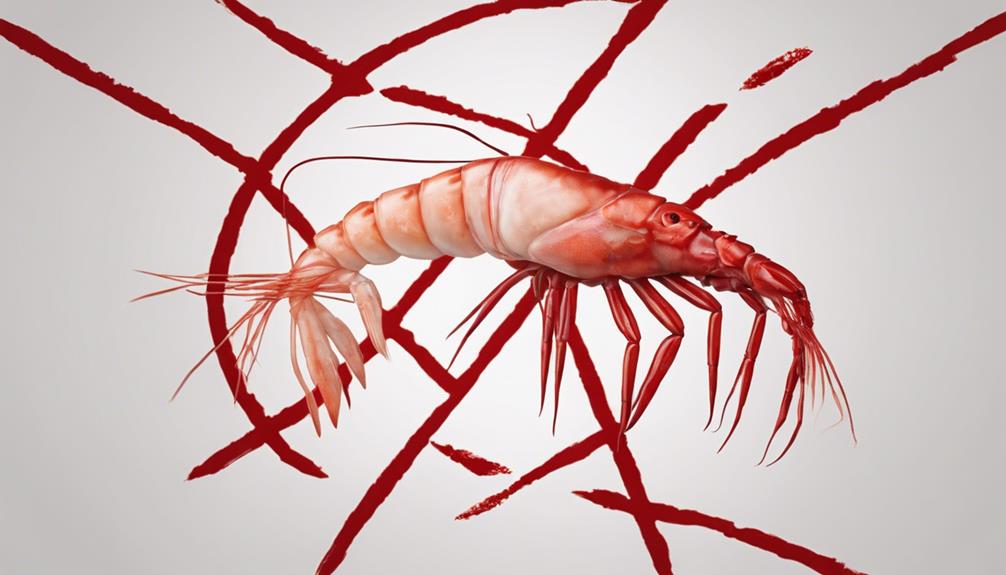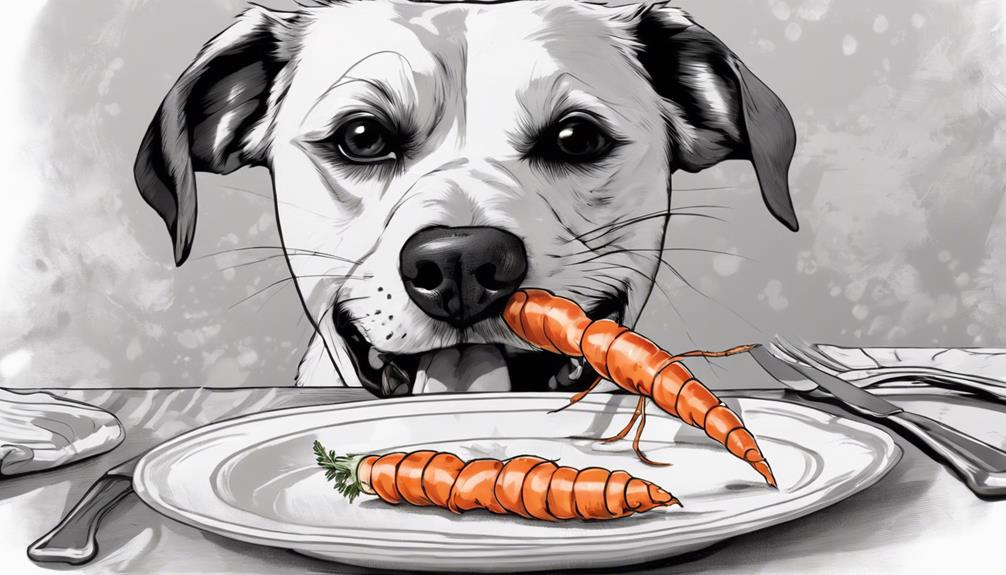Yes, dogs can eat shrimp, but remember important steps for their safety. Always cook shrimp thoroughly, remove the shell, veins, and tail. Cooked shrimp is rich in protein and low in calories. Avoid offering raw shrimp due to harmful pathogens. Watch for allergic reactions like itching or hives, and consult a vet if symptoms occur. Moderate shrimp intake to about 10% of their diet, considering weight and breed size. Opt for healthier cooking methods like boiling or baking. Keep exploring to discover more about shrimp safety and alternatives for dogs.
Key Takeaways
- Cooked shrimp is safe for dogs if prepared properly.
- Monitor for allergic reactions like itching or vomiting.
- Avoid raw shrimp due to harmful pathogens.
- Feed shrimp in moderation, about 10% of the diet.
- Consult a vet for personalized advice on shrimp consumption.
Shrimp Safety for Dogs
When adding shrimp to a dog's diet, it's vital to ensure thorough cooking and removal of the shell, veins, and tail to preserve their safety and well-being. Dogs eat cooked shrimp as it's important for them in moderation, offering health benefits like being high in protein and low in calories.
Ensuring that the shrimp is cooked thoroughly eliminates potential pathogens that could make dogs sick. Additionally, removing the shell, veins, and tail is essential to prevent choking hazards. Raw shrimp should be avoided altogether.
Allergic Reactions in Dogs

When dogs eat shrimp, some may develop allergic reactions to the proteins present. These reactions can lead to symptoms like itching, hives, swelling, or digestive problems in our furry friends.
It's important to observe your dog closely for any signs of allergies and seek veterinary advice promptly if any concerns arise.
Common Symptoms
Experiencing common symptoms of allergic reactions in dogs to shrimp can include vomiting and diarrhea. Additionally, dogs may show signs of hives or skin redness when allergic to shrimp.
In severe cases, anaphylaxis can occur, which is a life-threatening allergic reaction. Keep an eye out for itching, swelling, and changes in body temperature as these could indicate a shrimp allergy in dogs.
It's crucial to carefully monitor your dog for adverse reactions like redness, swelling, or gastrointestinal distress when introducing shrimp into their diet. If you notice any of these symptoms, consult with your veterinarian immediately.
Treatment Options
To address allergic reactions in dogs to shrimp, veterinarians may recommend antihistamines as a treatment option. When dealing with such situations, here are some important points to keep in mind:
- Timely Intervention: Administer antihistamines promptly upon noticing allergic reaction symptoms to alleviate discomfort.
- Consult Professional: Seek guidance from a veterinarian for appropriate antihistamine dosage and to rule out the necessity of corticosteroids.
- Close Monitoring: Observe your dog closely post-treatment for any adverse effects or the need for further medical intervention.
- Preventive Measures: Avoid exposing your dog to shrimp and other allergens to prevent future allergic episodes and safeguard their well-being.
Risks of Raw Shrimp

Consuming raw shrimp poses significant risks to dogs due to the presence of harmful pathogens that can cause various symptoms of illness. Raw shrimp contains bacteria and parasites that can lead to digestive issues like diarrhea, vomiting, nausea, and abdominal pain in dogs. If your dog shows any signs of sickness after eating raw shrimp, it's essential to seek immediate veterinary attention.
Additionally, raw shrimp can result in shellfish poisoning in dogs if not properly cooked. To guarantee the safety and well-being of your furry friend, it's best to avoid feeding them raw shrimp altogether. Instead, opt for cooked shrimp as a safer alternative.
Benefits of Cooked Shrimp

Indulging in cooked shrimp provides dogs with essential nutrients like protein, vitamin B12, and niacin, supporting their metabolism and overall well-being. Here are some benefits of feeding your furry friend cooked shrimp:
- Protein Powerhouse: Cooked shrimp is a great source of protein, which helps in building and repairing tissues, muscles, and cells, keeping your dog strong and energetic.
- Bone Health: Shrimp contains phosphorus, which is important for healthy bones and teeth in dogs. Including cooked shrimp in their diet can contribute to maintaining strong skeletal structure.
- Disease Prevention: The antioxidants found in shrimp can aid in reducing the risk of diseases like heart disease and cancer, promoting a longer and healthier life for your canine companion.
- Omega-3 Goodness: Omega-3 fatty acids in shrimp benefit heart and brain health, and can also help improve skin conditions in dogs, keeping their coat shiny and healthy.
Feeding your dog cooked shrimp in moderation can provide them with a variety of essential nutrients for a balanced and nutritious diet, supporting their overall well-being.
Moderation in Shrimp Consumption

Make sure that shrimp is a small part of your dog's diet to maintain balance and health. While cooked shrimp can be a tasty treat for your furry friend, it should only make up about 10% of their overall diet.
The majority of your dog's nutrition should come from well-balanced dog food to meet their dietary needs adequately. When feeding your dog shrimp, consider factors like their weight and breed size to determine appropriate portion sizes.
It's important to source high-quality shrimp from reputable sources to guarantee your dog's safety and health. Additionally, always thoroughly cook the shrimp, remove any shells, veins, and tails, and cut it into small, manageable pieces before serving it to your pet.
Avoiding Fried Shrimp

Opting for healthier cooking methods like boiling, steaming, or baking shrimp for dogs is advisable to avoid the potential risks associated with fried shrimp consumption. When it comes to our furry friends, we want to guarantee their well-being by steering clear of fried foods. Here are some reasons why avoiding fried shrimp is essential:
- High-Fat Content: Fried shrimp tends to be loaded with unhealthy fats that can be harmful to your dog's health.
- Unhealthy Ingredients: The breading used in fried shrimp may contain additives and preservatives that aren't suitable for canine consumption.
- Digestive Issues: Battered foods can be tough for dogs to digest, potentially leading to stomach upsets and discomfort.
- Pancreatitis Risk: Oils used in frying shrimp can trigger pancreatitis in dogs, a serious condition that requires veterinary attention.
Shrimp Alternatives for Dogs

When seeking appropriate alternatives to shrimp for dogs, consider various nutritious options like sardines, boneless cooked salmon, and green-lipped mussels.
Sardines are rich in omega-3 fatty acids, which support your dog's immune system and promote healthy skin and coat.
Boneless cooked salmon is another excellent choice as it provides high-quality protein and essential nutrients like vitamin B12 and selenium.
Green-lipped mussels are a great source of glucosamine and chondroitin, beneficial for joint health in dogs, especially seniors or those prone to joint issues.
These seafood alternatives aren't only delicious but also offer a range of health benefits for your furry friend. By incorporating a variety of options into your dog's diet, you can guarantee they receive a well-rounded nutrition without the need to rely solely on shrimp.
Remember to consult with your vet to determine the best alternatives based on your dog's specific preferences and dietary requirements.
Consulting a Vet for Guidance

Seeking guidance from a veterinarian before introducing shrimp into your dog's diet is essential for ensuring their health and well-being. When consulting a vet, you can expect personalized guidance tailored to your dog's specific needs.
Vets can provide insights into potential allergies your dog may have towards shrimp, helping you avoid any adverse reactions. They can recommend safe portion sizes based on your dog's size, weight, and overall health, ensuring a balanced diet.
Additionally, vets can advise on the best cooking methods for shrimp to maintain its nutritional value and minimize any risks associated with feeding it to your dog.
Frequently Asked Questions
Can Dog Eat Cooked Shrimp?
Yes, dogs can eat cooked shrimp. It's safe for them, but be sure to remove shells and tails first to prevent choking.
Due to its high cholesterol, shrimp should be given in moderation. Start with small portions, like one or two pieces, and consult a vet for advice on the right amount for your furry friend.
Enjoy shrimp with caution and always prioritize your dog's health and safety when sharing this tasty treat.
Is It OK for Dogs to Eat Shrimp Shells?
We must avoid feeding dogs shrimp shells as they pose a choking hazard and can lead to intestinal blockages.
Shrimp shells are challenging for dogs to digest, containing chitosan that's tough on their digestive system.
To prevent any health issues, always remove shrimp shells before offering shrimp to your furry friend.
Can Dogs Have a Reaction to Shrimp?
Yes, dogs can have a reaction to shrimp. Symptoms of a shrimp allergy in dogs may include itching, redness, swelling, or gastrointestinal problems. Allergies can develop with repeated exposure, so it's vital to introduce shrimp slowly into your dog's diet.
If you suspect an allergic reaction, consult a veterinarian. Monitoring your dog's response to new foods is essential for their well-being.
How Many Prawns Can a Dog Eat?
We should consider the specific dog's weight and breed size when determining how many shrimp prawns they can eat.
It's important to remember that treats, like shrimp, should only make up 10% of a dog's diet.
Additionally, it's advisable to monitor our furry friends for any signs of discomfort or illness after feeding them shrimp.
For detailed advice on the suitable amount of shrimp for your dog, reaching out to a vet or nutritionist is wise.
Conclusion
To sum up, while dogs can consume shrimp in moderation, it's crucial to make certain that it's cooked and served plain without any seasoning or additives.
Raw shrimp should be avoided due to potential risks, and fried shrimp isn't a healthy option for our canine companions.
As always, seeking advice from a vet for guidance on your dog's diet is the best way to guarantee their health and well-being.
Remember, just like with any food, moderation is key for a happy and healthy pup.









